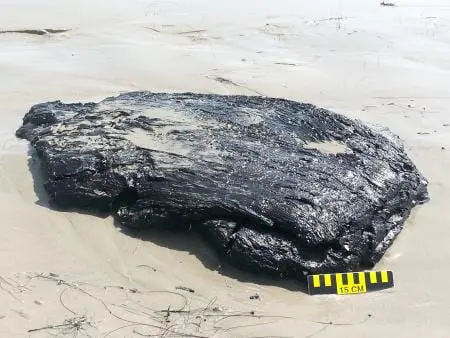 Now there is something you don’t see everyday.
Now there is something you don’t see everyday.
Giant balls of tar began washing up on Texas beaches this week.
Coast Guard members are working with Miller Environmentral Services and Texas General Land Office specialists to clean up naturally occurring tar balls discovered on 20-mile stretch of land from Padre Island National Seashore to the beaches of Port Aransas, Tuesday.
Beachgoers contacted Coast Guard Station Port Aransas Sunday to report that tar patties were washing ashore. Sector Corpus Christi deployed personnel from their Incident Management Division to respond.
Currently, a team comprised of individuals from the three agencies is surveying the shoreline and removing the tar balls.
“The tar balls range from very small to as big as three feet by three feet,” said Lt. Patrick Marshall, the chief of Sector Corpus Christi’s Incident Management Division. “This cleanup is not part of any ongoing investigation as tar balls are a naturally occurring event with natural seepage in the Gulf of Mexico.”
Tar balls are not uncommon along the Gulf Coast and are formed when an accumulation of thick oil is battered by wave action until it breaks apart in the form of small round clumps. Tar balls are generally not associated with fresh oil, rather, they are usually the result of oil that has been present in the water for some time. Oil or tar balls suspected to be from a spill are tested to see if they match the suspected source.
Anyone discovering tar balls or pollution is asked to immediately contact the National Response Center at 1-800-424-8802. The Coast Guard and its partner agencies strongly urge the public not to attempt to clean up any pollution. If contact occurs, wash the area with soap and water, baby oil or a widely used, safe cleaning compound such as the cleaning paste sold at auto parts stores. Avoid using solvents, kerosene, diesel fuel or similar products on the skin as these products, when applied to skin, present a greater health hazard than the oil.

